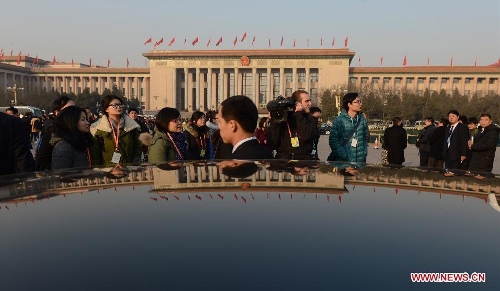HOME >> CHINA
China's parliament to convene annual session on March 5
Source:Xinhua Published: 2013-12-29 8:47:46

Journalists wait to interview deputies to the 12th National People's Congress (NPC) at the Tian'anmen Square in Beijing, capital of China, March 5, 2013. The first session of the 12th NPC opened in Beijing on March 5. (Xinhua/Qin Qing)
The National People's Congress (NPC), China's top legislature, is to convene its annual session in Beijing on March 5 next year.
The decision to hold the Second Session of the 12th NPC in March next year was adopted at a bimonthly session of the NPC Standing Committee, which concluded here on Saturday.
The suggested agenda for the session includes the government work report; implementation of the annual plan on economic and social development in 2013; a draft plan on national economic and social development in 2014; central and local budgets in 2013; and the draft central and local budgets for 2014.
The session will also hear and deliberate work reports by the NPC Standing Committee, the Supreme People's Court and the Supreme People's Procuratorate.
In addition, the presidium of the National Committee of the Chinese People's Political Consultative Conference (CPPCC), China's top political advisory body, met on Friday.
It was suggested at Friday's meeting that the second annual session of the 12th CPPCC National Committee should open on March 3, 2014.
It was decided at the meeting that the fourth meeting of the 12th CPPCC National Committee will be held between February 26 and 28 next year to prepare for the annual session.
The presidium meeting was presided over by Yu Zhengsheng, chairman of the CPPCC National Committee.
The NPC is the highest institution through which the Chinese people exercise their state power. All administrative, judicial, procuratorial and military organs and other state-level institutions are accountable to the NPC and supervised by it.
Founded in 1949, the CPPCC, which serves as a key mechanism for multi-party cooperation and political consultation under the leadership of the Communist Party of China, consists of elite figures of the Chinese society who are willing to serve the think tank for the government and for the country's legislative and judicial organs.
Posted in: Politics